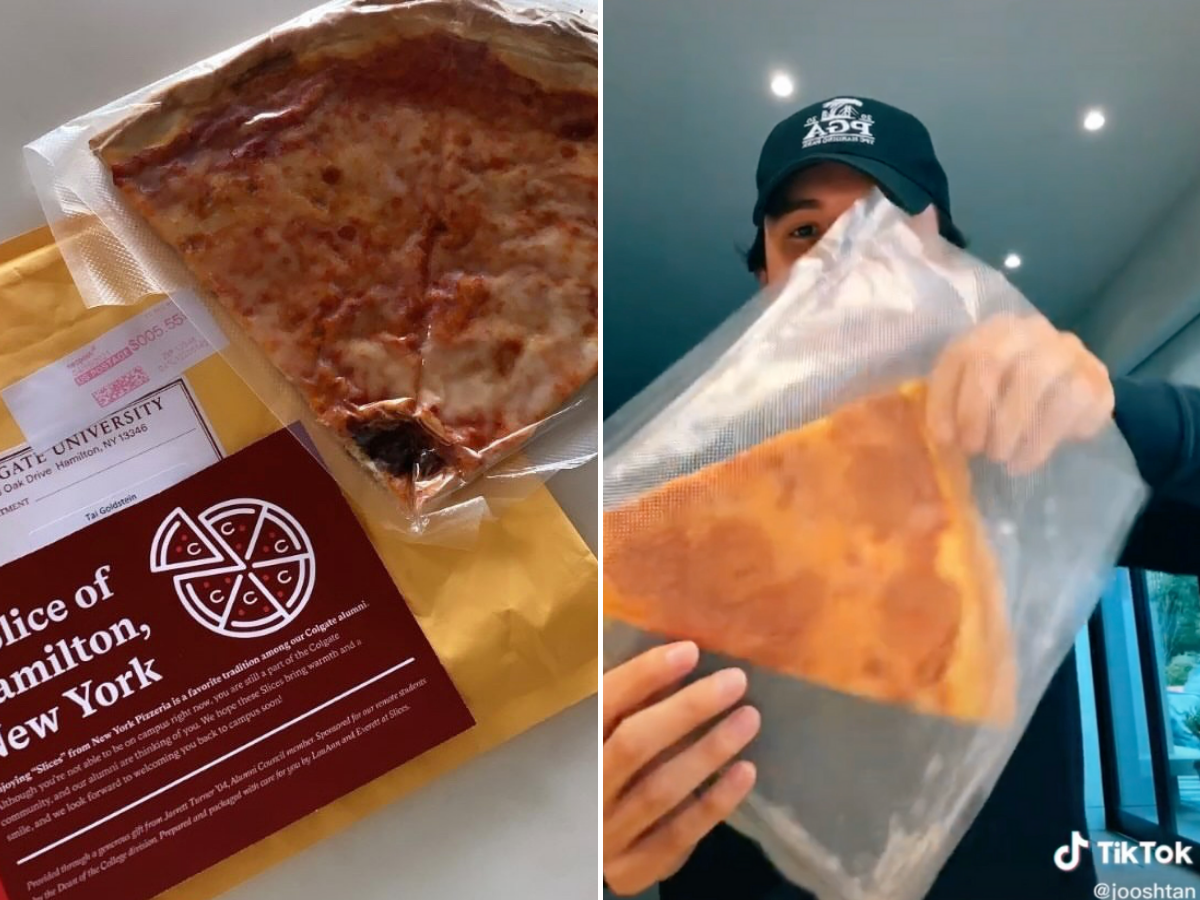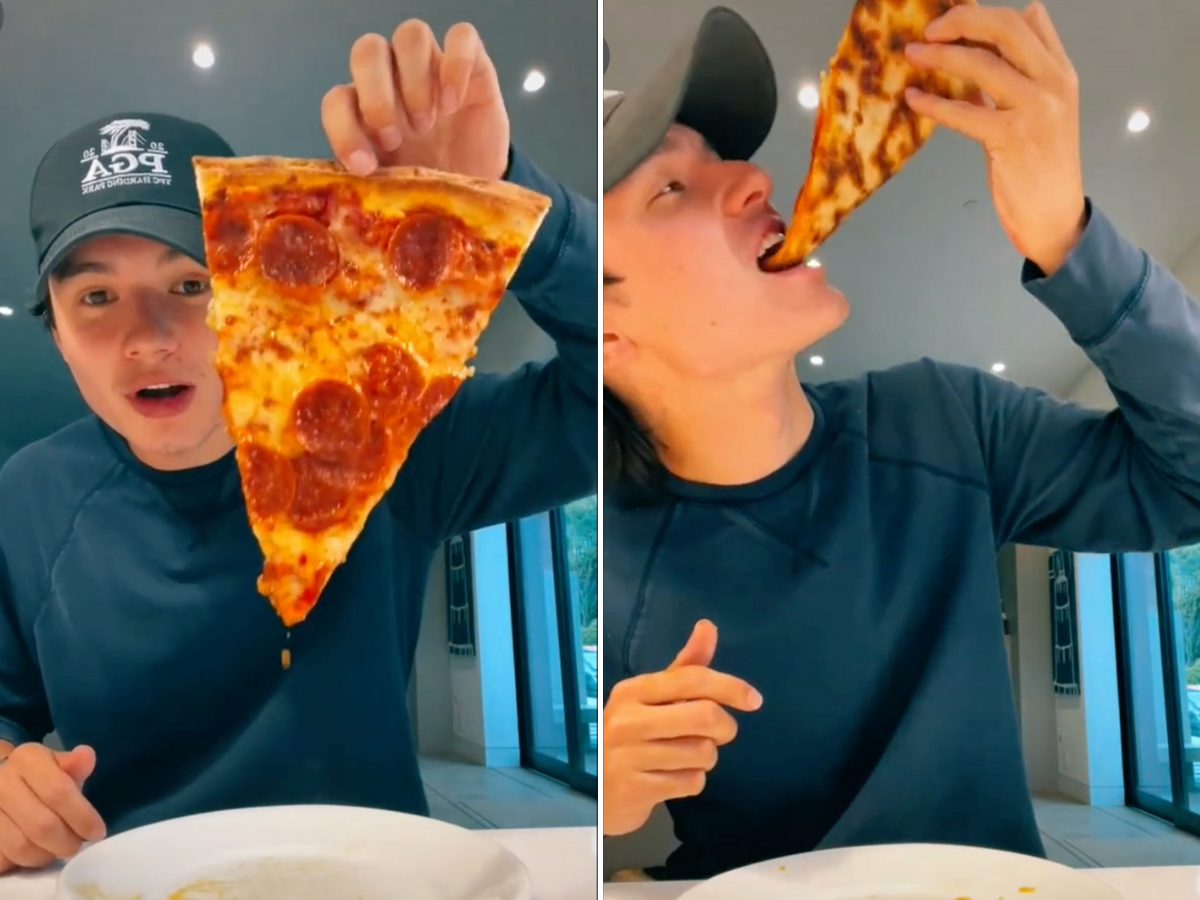
Tai Goldstein/Josh Tan
- This week, remote students at Colgate University received surprise packages from the college.
- Tucked inside manila envelopes were vacuum-sealed slices of cheese and pepperoni pizza.
- Students took to TikTok to share their reactions, and food safety experts weighed in.
- Visit Insider's homepage for more stories.
On Wednesday, Josh Tan opened his mailbox to find a cheesy surprise from his college Colgate University.
Inside a cushioned manila envelope were two slices of vacuum-sealed pepperoni pizza.
Tan, a junior taking remote classes in San Francisco, California, told Insider that he received the pizza along with a note that read, "a slice of Hamilton, New York," which is where his university is based.
Colgate University sent pizza to its nearly 300 remote students so they could enjoy the college-town favorite New York Pizzeria from home, a spokesperson for the school told Insider.
After receiving the pizza, some students posted TikTok videos sharing taste tests and voicing their surprise at the unique care packages.
Three food safety experts told Insider the gift was well-intended, and it could be safe to eat if the pizza was reheated and the correct preservatives were used. But they agreed that they, personally, wouldn't eat the mailed pizza.
The pizza arrived this week, and one student was pleasantly surprised by its taste

Josh Tan
With another semester of remote classes for some Colgate University students, the school and alumni wanted to remind virtual students that they were still part of the Colgate community.
So alumni and the Dean of the College Division decided to send about 300 remote students slices from a local beloved pizzeria, New York Pizzeria, which is nicknamed "Slices."
"We hope the pizza will bring smiles to the faces we have so missed seeing on campus this semester," a spokesperson for the college told Insider in an email.
"It took a lot of time and a lot of energy, but I think we pulled it off," LuAnn Hance, a partial owner of New York Pizzeria, told Insider. She estimated that it was about 70 pizzas, which they vacuum-sealed in packages of two.
Tai Goldstein, a junior studying remotely in New York City, told Insider the package was a complete surprise.
"I was honestly pretty confused and had no idea it was supposed to come but found it to be quite hilarious," Goldstein told Insider. "It absolutely made myself and fellow students smile."
Goldstein posted the surprise care package on TikTok and it quickly gained nearly half a million views. Soon, a handful of Colgate students were sharing their vacuum-sealed pizza packages.
The comment section on Goldstein's video was full of shocked and confused reactions.
"Am I going to apply to Colgate next year for this very reason? Yes, yes I am," one user commented.
Another person wrote, "I'm seeing this everywhere, and I need to know how its tastes."
Tan also wanted to know how his pizza - which traveled thousands of miles from Hamilton to San Francisco - tasted. So he created a TikTok account to share his reaction.
"It definitely would be better fresh, but for pizza shipped across the country, it was actually pretty good," he told Insider.
Food safety experts said the pizza is probably safe to eat, but they wouldn't eat a slice themselves
Some TikTokers in the comment section were concerned about how safe it would be to eat vacuum-sealed pizza that traveled in the mail.
Bill Marler, a food poisoning attorney, said he thinks the pizza could be safe to eat, but with some caveats.
"Pizza, especially with limited toppings, is safe given that the cheese is pasteurized, and the pepperoni is so cured - and if it well cooked - the pizza is safe," he told Insider in an email. His only concern was the flour, which can harbor harmful bacteria if it's not cooked properly.
But before a student takes a bite, he urged them to reheat it first.
"The best rule about take-out or 'mail-in' is to keep hot things hot and cold things cold," he told Insider in an email. "If the college is going to do this, I would urge them to ask the students to reheat the pizza before consuming."
Randy Worobo, a professor of food microbiology at Cornell University, agreed and said it could be OK to eat.
"Assuming the mailing takes less than seven days, and if it is reheated to more than 165 degrees Fahrenheit before eating, it would be a low chance for the student getting sick," he said in an email.
Martin Bucknavage, a senior food safety extension associate at Penn State Department of Food Science, said he would need to know more about how the pizza was packaged before taking a bite.
He told Insider that he would want to make sure the pizzeria has the proper regulatory approval, which would ensure that the pizza and packaging have the right types of preservatives to prevent bacteria growth that could cause food poisoning.
Hance said the pizza was frozen, packaged using a vacuum sealer, and then refrozen before the university shipped it out.
When asked if they would eat the pizza, Bucknavage, Worobo, and Marler agreed they wouldn't.
"I would pass on the mail-in pizza," Marler said. "Nice gesture, however."